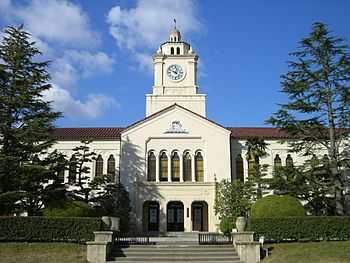William Merrell Vories
Merrell Hitotsuyanagi (一柳米来留,ひとつやなぎ めれる; October 28, 1880 - May 7, 1964), born William Merrell Vories, was an educator, architect, entrepreneur, Christian lay missionary, and founder of the Omi Mission. Born in the United States, he later became a naturalized Japanese citizen. [1]
Merrell lived and worked mainly in Shiga prefecture in Japan. With only limited formal training as an architect, he founded an architectural office in Shiga which employed over thirty professional staff and was responsible for the design of well over 1000 residential, commercial, and church structures in Japan and occupied Korea, prior to the Second World War.
Biography
Vories was born in Leavenworth, Kansas in 1880. He graduated from Colorado College in 1904. At first he hoped to be an architect, although he came to Japan in 1905 as an English-language teacher, with an intention to engage in Christian missionary work. While working as a teacher in Omi Hachiman, Shiga prefecture, he was asked to inspect the construction of Kyoto YMCA office building in 1908, and thus started an architectural design firm (later called "W.M.Vories & Company Architects Ichiryusha").[2]
Through YMCA activities in Japan, Vories became acquainted with many American and Japanese people, and received numerous commissions to design houses, churches, schools, hospitals, and YMCA facilities.
In 1917, Vories married the daughter of viscount Suenori Hitotsuyanagi, Makiko Hitotsuyanagi (一柳満喜子 Hitotsuyanagi Makiko, 1884-1969). He became a naturalized Japanese citizen in 1941, taking his wife's family name of Hitotsuyanagi.[3]
In 1918, he founded the Omi Mission, and devoted his efforts to Christian missionary work and education. However, he was also an entrepreneur, and established Omi Sales Company in 1920, to promote an ointment named Mentholatum to earn funds to support his missionary work. The company was renamed Omi Brothers (近江兄弟社 Ōmi Kyōdaisha) in 1934.
Vories also loved music, and is credited with introducing the Hammond Organ into Japan.
He was posthumously awarded the Order of the Sacred Treasure, 3rd class, by the Japanese government. His house in Omi Hachiman is now the "Vories Commemorative Museum".
-
Murotani house
-

Osaka Church (the United Church of Christ in Japan)
-

Vories memorial house
References
- ↑ Larking, Matthew (February 28, 2008). "The time before the starchitects". Japan Times. Retrieved 14 December 2014.
- ↑ 会社のご案内 − 歴史年表 | 一粒社ヴォーリズ建築事務所
- ↑ Colorado College Tutt Library: Special Collections
Books
| Wikimedia Commons has media related to William Merrell Vories. |
- "ヴォーリズの建築―ミッション・ユートピアと都市の華" 山形 政昭 1989 ISBN 4-422-50123-2
- "ヴォーリズの西洋館―日本近代住宅の先駆" 山形 政昭 2002 ISBN 4-473-01890-3
- "ウィリアム・メレル・ヴォーリズ―写真集 日本人を越えたニホン人" 山田プランニング 1998 ISBN 4-939022-99-4
- "ヴォーリズ建築の100年―恵みの居場所をつくる" 2008 ISBN 4-422-50124-0
- "ヴォーリズ評伝―日本で隣人愛を実践したアメリカ人" 奥村直彦 2005 ISBN 4-88008-332-1
- "青い目の近江商人メレル・ヴォーリズ―創業者精神「信仰と商売の両立の実践」を受け継いで" 岩原 侑 1997 ISBN 4-88737-045-8
- "青い目の近江商人ヴォーリズ外伝―「信仰と事業の両立」を果たした師ゆかりの地を歩いて" 岩原 侑 2002 ISBN 4-8355-3879-X
External links
- "W.M.Vories & Company Architects Ichiryusha"s official site
- Vories Commemorative Museum home page
- William Merrell Vories, Omihachiman Tourism Association
|

